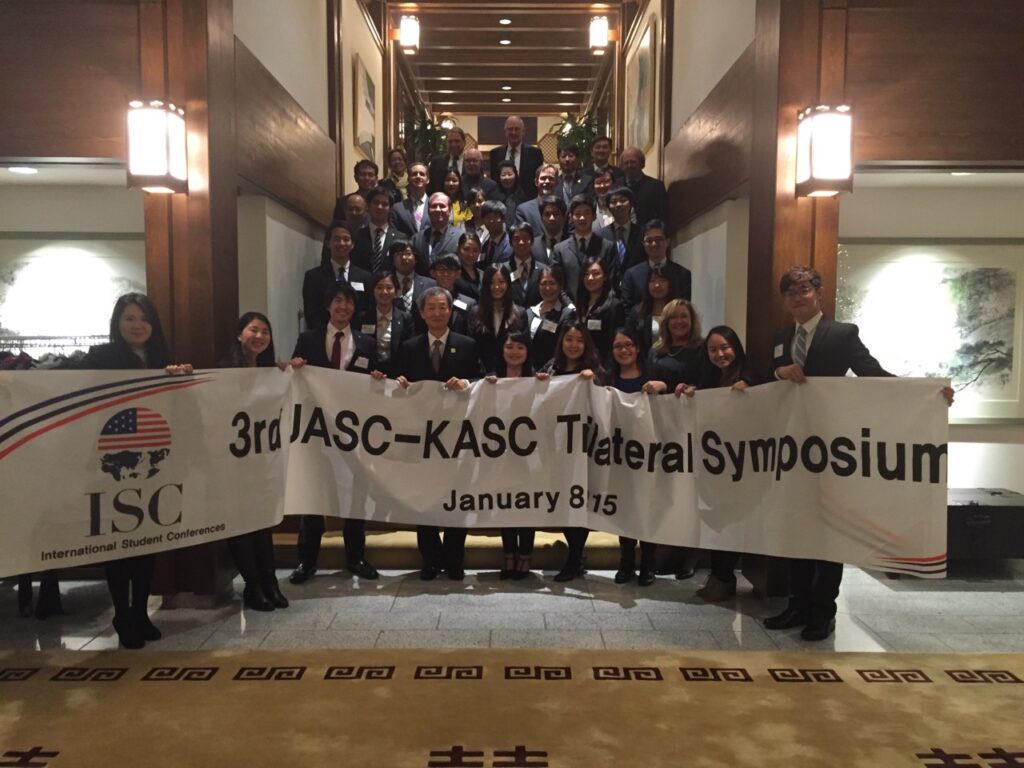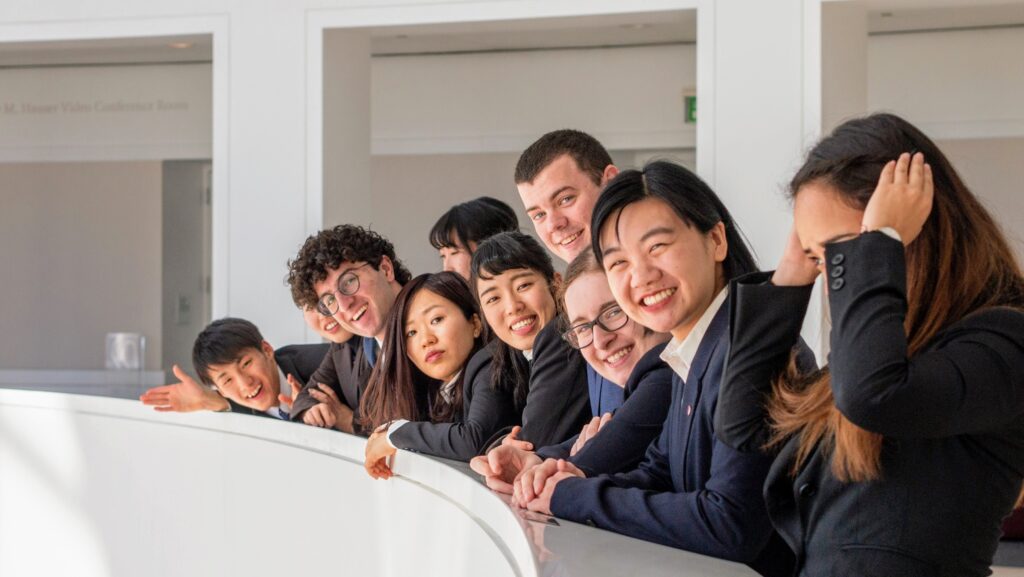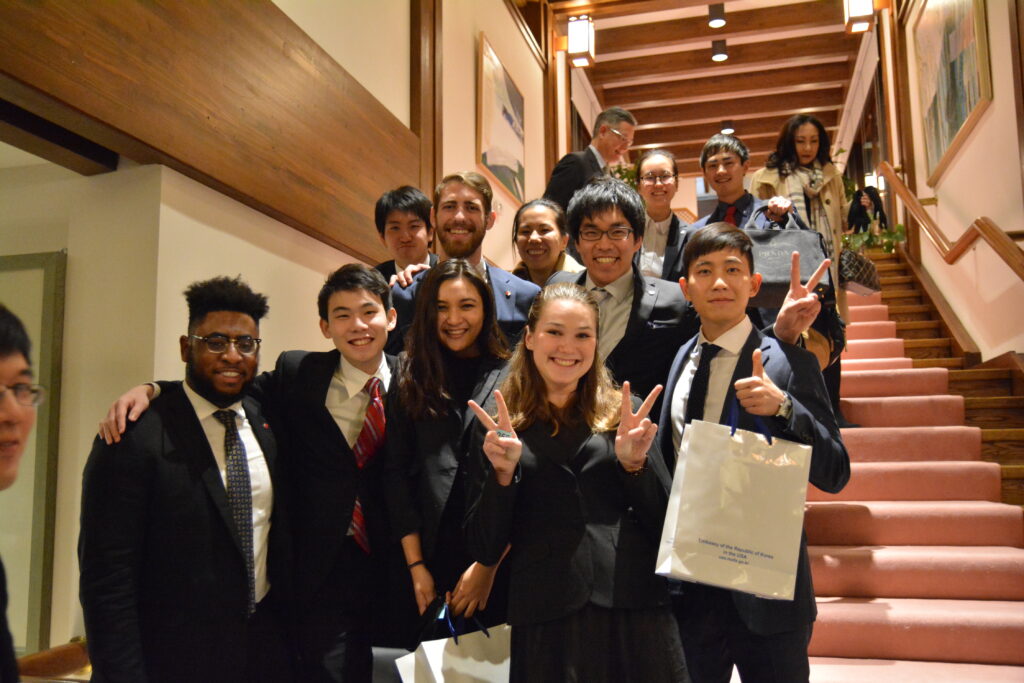2025 9th Trilateral Forum
The Trilateral Forum took place from January 4-11, 2025, with sixteen Japanese and American students representing the 77th Japan-America Student Conference, four Korean and American students representing the 18th Korea-America Student Conference, and six students representing the China-America Student Conference, three ISC interns, and staff, regional experts, and government officials.
The program developed these students’ understanding of and interest in governmental, business, and security relations between the United States, Japan, and South Korea. The 2025 program included a focus on technology and welcomed speakers on artificial intelligence and auto manufacturing, along with visits to the Korean and Japanese embassies and programming with the State Department Office of Women, Peace, and Security. Thank you to our forum sponsors: Korea Foundation and United States-Japan Foundation.
The 9th U.S.-Japan-Korea Symposium was held on January 9th, 2025 from 1 PM to 5 PM in Washington, DC at FIU in DC, 601 New Jersey Ave NW suite 103, Washington, DC 20001. The symposium addressed the question: How does technology impact trilateral cooperation among the U.S., Japan, and South Korea? The program included two panels on sub-topics with expert speakers representing the US, Japan, and Korea and student speakers representing JASC and KASC. In panel two, the selected student speakers will provide perspectives on key issues through a student lens, bringing their voices to these discussions.
Panel 1: What policies are being made regarding new technologies and how does US-Japan-Korea trilateral cooperation play a role in these policy decisions?
Our expert panel was moderated by Melanie Berry, a Vice President at The Asia Group. Speakers were:
- Kellee Wicker, Director of the Science and Technology Innovation Program at the Wilson Center
- Kayla Orta, Senior Associate at the Hyundai Motor-Korea Foundation Center for Korean History and Public Policy at the Wilson Center
- Jim Schoff, Senior Director of the US-Japan NEXT Alliance Initiative at Sasakawa Peace Foundation USA.
Panel 2: How does AI influence trilateral cooperation? What role does AI play in students’ understanding of other countries and cultures?
Our student panel was moderated by Bahia Simons-Lane, Executive Director, International Student Conferences. The student panelists were:
- Emile Shah, American Executive Committee Member, The 77th Japan-America Student Conference (JASC)
- Mayu Kitahara, Japanese Executive Committee Member, The 77th Japan-America Student Conference (JASC)
- Valerie Grau, American Executive Committee Member, The 18th Korea-America Student Conference (KASC)
- Somin Hwang, Korean Executive Committee Member, The 18th Korea-America Student Conference (KASC)
Thank you to our symposium sponsors: The Korea Foundation and Sasakawa Peace Foundation USA.
2024 8th Trilateral Forum
International Student Conferences’ 8th U.S.-Japan-Korea Trilateral Forum took place in January 2024, bringing together the Executive Committee members (ECs) representing the Japan-America Student Conference (JASC), Korea-America Student Conference (KASC) and the China-America Student Conference (ChASC) for a weeklong program in Washington, D.C. During the forum, these open-minded and forward-thinking student leaders participate in workshops with each other, ISC staff and interns, regional experts, and government officials.
The 8th Trilateral Symposium consisted of two panels. Panel 1 centered on the theme, “What is history’s role in key regional issues involving Japan, South Korea, and the United States?” Dr. Victor Cha of the Center for Strategic and International Studies, Dr. Christopher Johnstone of the Center for Strategic and International Studies, and Mr. Frank Aum of the U.S. Institute for Peace served as the panelists, with Ms. Kayla Orta of the Wilson Center moderating. The panelists discussed the recent positive developments in strengthening the Trilateral relationship and noted tentative optimism for continuing the current momentum for relationship-building.
Panel 2 focused on the question, “What is the role of education in shaping students’ perspectives of trilateral issues?” Two student panelists represented the Japan-America Student Conference and the Korea-America Student Conference. Will Sim-Oliver, the American Treasurer of the JASC 76 American Executive Committee, spoke regarding practical ways to incorporate trilateral education into the American education system. Grace Smith, the American Chair of the KASC 17 American Executive Committee, discussed ways to facilitate a better understanding of Trilateral issues in the younger generation. Nozomi Miyamoto, the Recruitment Chair of the JASC 76 Japanese Executive Committee, elaborated on the importance of teaching Trilateral education in Japan to sustain the relationship. Hyeonyool Kim, the Korean Chair of the KASC 17 Korean Executive Committee, concluded the panel by reflecting on the impact of the differences in historical education in each country within the trilateral relationship.
2020 7th Trilateral Forum
The 7th U.S.-Japan-Korea Trilateral Forum centered around the themes, “Forming Opinions, Shaping the Future: The Impact of Social Media on U.S.-Japan-Korea Relations” and “The Future of U.S.-Japan-Korea Trilateral Relations: Challenges and Prospects.” The forum encouraged a timely discussion between motivated student leaders and distinguished professionals, showcasing the younger generation’s enthusiasm for cooperative and active trilateral engagement. The symposium was held January 10, 2020, on Capitol Hill in Washington, D.C.
The first panel, “Forming Opinions, Shaping the Future: The Impact of Social Media on U.S.-Japan-Korea Relations,” featured two student panelists: Jennifer Lam, from the 13th Korea-America Student Conference (KASC), and Mai Bando, from the 72nd Japan-America Student Conference (JASC). Joining them were two distinguished leaders: Mr. Marc Knapper, Deputy Assistant Secretary for Korea and Japan, U.S. Department of State, and Ms. Jenna Golden, Founder and President of Golden Strategies and former head of political and advocacy sales team at Twitter. Serving as moderator was Mr. Masashi Murano, Japan Chair Fellow, Hudson Institute.
The second panel, “The Future of U.S.-Japan-Korea Trilateral Relations: Challenges and Prospects,” featured two student panelists: Deborah Jeong, from the 13th Korea-America Student Conference (KASC), and Celinda Chang, from the 72nd Japan-America Student Conference (JASC). The two expert panelists were Mr. Scott Snyder, Senior Fellow for Korea Studies, Council on Foreign Relations and Member, ISC National Advisory Committee, alongside Dr. Patrick Cronin, Asia-Pacific Security Chair, Hudson Institute. Joining the panelists as moderator was Emma Chanlett-Avery, Specialist in Asian Affairs, Congressional Research Service.
2019 6th Trilateral Forum
The 6th Trilateral Forum was co-hosted by the Sasakawa Peace Foundation USA and the Korea Foundation (KF). At the annual symposium, the first panel, titled “Role of Soft Power and Media in Trilateral Relations,” featured Kathleen Stephens, former U.S. Ambassador to South Korea and current CEO of the Korea Economic Institute of America, and Wataru Sawamura, Washington Bureau Chief of the Asahi Shimbun. Student voices included Ayoung Kim, Chair of the 12th Korea-America Student Conference, and Kaho Maeda, Vice Chair of the 71st Japan-America Student Conference. The panel was moderated by Andrew Yeo, an Associate Professor of Politics and Asian Studies.
The second panel, “Areas of Collaboration in Addition to Regional Security,” brought together Emma Chanlett-Avery, Specialist in Asian Affairs at the Congressional Research Service, and Richard Fontaine, President of the Center for a New American Security. Damare Baker, Recruitment Chair for the 12th KASC, and Shunji Fueki, a member of the American Executive Committee for the 71st JASC, represented the student perspective. Sophie Osborn, a former KASC Executive Committee member, moderated the discussion.
2018 5th Trilateral Forum
The 5th Trilateral Forum provided an opportunity for the next generation of U.S.-Asia Pacific leaders to provide feedback on moving the U.S.-Japan-Korea relationship forward, facilitating dialogue on the importance of the trilateral relationship for peace, stability and prosperity in the Asia-Pacific region. In the week leading up to the symposium, the students participated in a joint program between Japan-America Student Conference ( JASC) and Korea-America Student Conference (KASC), which enabled students to interact with policy experts, diplomats, and media representatives from the three countries, allowing them to examine trilateral issues from multiple perspectives.
The symposium began with the panel “Digital Diplomacy,” moderated by Wallis Stanfield from Auburn University and an alumna of the 2016 Japan-America Student Conference. The panel featured expert insights from Julie Chung, Director of the Office of Japanese Affairs at the U.S. Department of State, Karl Friedhoff, a Fellow in Public Opinion and Foreign Policy at the Chicago Council on Global Affairs, and Shanti Shoji, Co-Founder and Vice President of Kizuna Across Cultures. The student panelists included Rebecca Anderson, U.S. Chair of the Korea-America Student Conference and a student at Yonsei University, as well as Ayano Sasaki, Japan Chair of the Japan-America Student Conference and a student at Kyushu University.
Panel two, “Challenges in the Workplace,” followed, moderated by Florence Maher from the U.S. Department of State, an alumna of the 2008 Korea-America Student Conference and the 2005 Japan-America Student Conference. The panel included Frank Ahrens, author of “Seoul Man” and Vice President at BGR Public Relations, and Brigid Schulte, Director of the Better Life Lab and The Good Life Initiative at New America. Student perspectives were provided by Erika Ito, Japan Chair of the Japan-America Student Conference and a student at Tohoku University, and Jiyoung Park, a student from Ewha Woman’s University.
2017 4th Trilateral Forum
The 4th Trilateral Forum took place from January 2nd through the 7th. In the week leading up to the symposium, the students participated in a joint program between Japan-America Student Conference (JASC) and Korea-America Student Conference (KASC), which enabled students to interact with policy experts, diplomats, and media representatives from the three countries, including speakers from the Council on Foreign Relations, Stimson Center, and Bureau of East Asian and Pacific Affairs.The 4th Symposium took place on January 5th, 2017 at the National Press Club with the theme, “Mutual Understanding in a Time of Division.” The Symposium showcased three panels on “North Korea Security and Human Rights,” “Women and Leadership,” and “Recommendations for Next Administrations.”
The symposium’s first panel, “North Korea Security / Human Rights,” was moderated by Danny Jeon, a Johns Hopkins SAIS graduate and an alum of the 2015 and 2016 Japan-America Student Conference. The panel featured expert insights from Bruce Klingner, Senior Research Fellow at The Heritage Foundation, and Greg Scarlatoiu, Executive Director of the Committee for Human Rights in North Korea (HRNK). The student panelists included Minji Huh, Korea Chair of the Korea-America Student Conference and a student at Ewha Womans University, and Kumi Yoshikawa, Japan Chair of the Japan-America Student Conference from Keio University.
The second panel “Women and Leadership” followed, moderated by Kaede Yoshioka, U.S. Chair of the Japan-America Student Conference and a student at UC Berkeley. The panel included Eileen Pennington, Associate Director of the Women’s Empowerment Program at the Asia Foundation. Student perspectives were provided by Erin Norris, U.S. Chair of the Japan-America Student Conference from Northeastern University, and Sophie Osborn, U.S. Chair of the Korea-America Student Conference and a student at UC San Diego.
2015 3rd Trilateral Forum
On January 8th, 2015, the 3rd JASC-KASC Trilateral Symposium brought together 24 JASC and KASC student leaders from the US, Japan, and Korea to discuss the future and cooperation of the three countries. The students discussed three timely topics: security alliance, immigration, and urban sustainability and challenges. The goal of the forum was to give voice to the younger generation and demonstrate their ability to overcome the issues of the past and have a productive and forward-looking dialogue on U.S.-ROK-Japan relations.


2014 2nd Trilateral Forum
The 2nd Trilateral Forum took place the week of January 30, 2014. Due to a generous grant, ISC brought student leaders from South Korea and Japan to participate in immersive programming in Washington, D.C. for the Forum. The week-long Forum was marked by the instant bonding that took place between JASC and KASC students from each of the three countries. Following the theme, “Advancing Trust in the U.S.- Japan-Korea Partnership,” the public Symposium took place at the Carnegie Endowment for International Peace and had a much larger audience than the previous year. During the Symposium, students participated in panels on “Historical Controversies and Security” with Dr. Michael Green and Dr. Victor Cha, and “Women in Society” with Ms. Chiyo Kobayashi and Ms. Florence Lee.
2013 1st Trilateral Forum
International Student Conferences’ very first Trilateral Forum was held the week of June 6th, 2013. The Symposium theme, “Fostering the U.S.-Korea-Japan Partnership for the Future,” brought together subject matter experts, the student leaders of JASC and KASC, as well as D.C.-based university students and young professionals. As the first Trilateral program facilitated by ISC, the Symposium gathered an esteemed panel of experts including, Ambassador Thomas Hubbard, Ambassador Kathleen Stephens, Glen S. Fukushima, Tami Overby, as well as representatives from U.S. Department of State. Representatives from both the Korean and Japanese Embassies were also in attendance, discussing issues relevant to the U.S.-Korea-Japan trilateral partnership on a wide range of topics, including security cooperation, aging societies, commercial and trade relations, and job creation.

